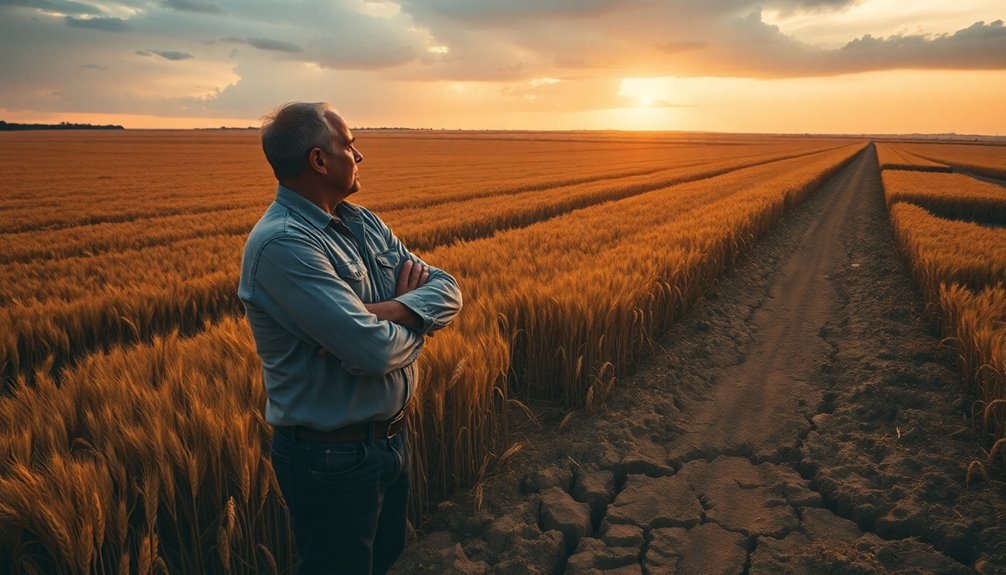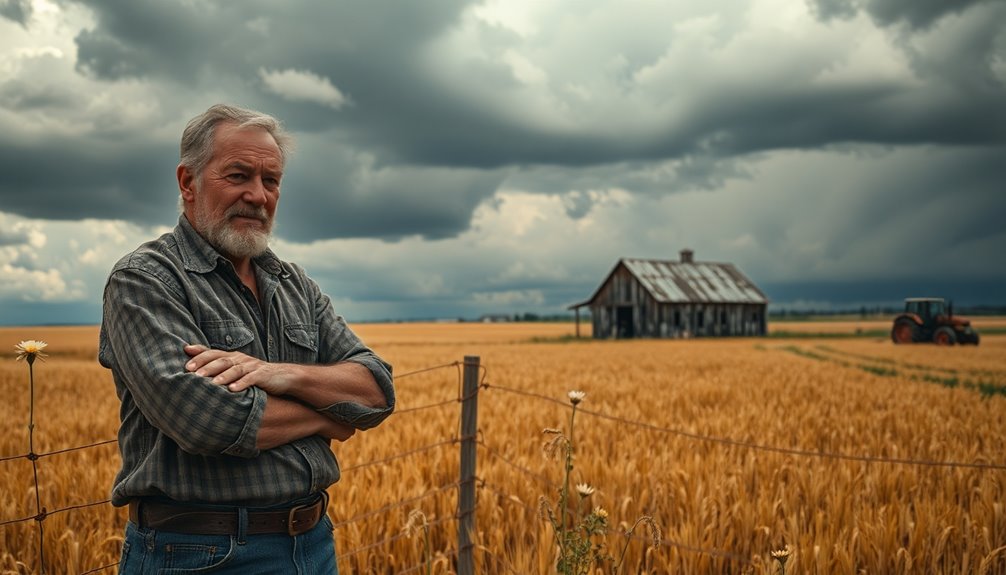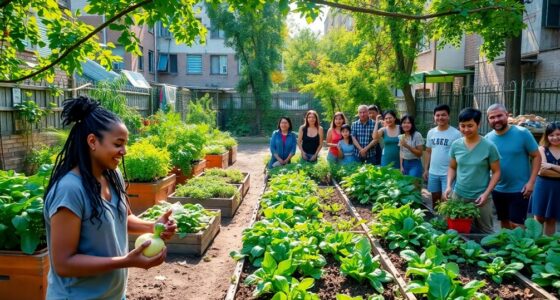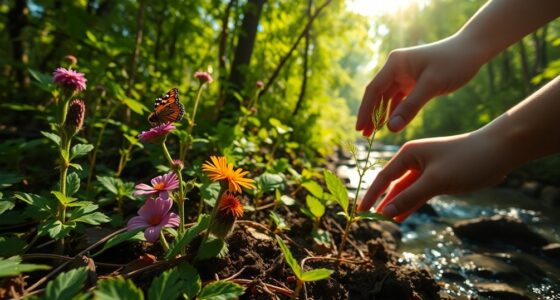Farmers in Kansas and Missouri often stay silent about climate change, despite its real impacts on their crops and livelihoods. Many fear conflict or have economic worries that stop them from discussing the issue. This reluctance creates a barrier to finding common ground and sharing solutions. However, fostering open conversations can lead to better adaptation strategies and community support. There's much more to uncover about how this silence affects your local farming community's future.
Key Takeaways
- Farmers in Kansas and Missouri often avoid discussing climate change due to fear of conflict and political divisions within their communities.
- Economic concerns and market fluctuations lead to reluctance in addressing climate impacts, as farmers worry about jeopardizing their businesses.
- The "spiral of silence" phenomenon discourages farmers from voicing their thoughts, perpetuating a cycle of silence on climate issues.
- Open dialogue among farmers is crucial for fostering collaboration and finding collective adaptation strategies to combat climate challenges.
- Sustainable agriculture practices, like drought-resistant crops and advanced irrigation, can help farmers adapt while addressing climate change impacts.

As climate change increasingly disrupts agricultural practices, many farmers find themselves hesitant to engage in conversations about its impacts. You might notice that discussions on this topic often lead to uncomfortable silences, even among family and friends. Fear of conflict, economic concerns, and political divisions contribute to this reluctance, making it tough to open up about something that deeply affects your livelihood.
Many farmers, like you, may feel under siege, often blamed for greenhouse gas emissions and other environmental issues. This blame can create a "spiral of silence," where you perceive dominant opinions discouraging you from voicing your thoughts. The politicization of climate change complicates matters further, as differing beliefs can fracture communities, making candid conversations feel impossible.
You know firsthand how rising temperatures and unpredictable weather patterns disrupt your farming operations. Extreme weather events can lead to diminished crop yields and hurt livestock productivity. With shifting growing seasons and increasing pest pressures, adapting to these changes feels like an uphill battle. You may find yourself wondering how to implement effective farming practices without incurring high costs. Sustainable agriculture practices can help you adapt to these challenges while maintaining your livelihood.
To navigate these challenges, many farmers are turning to innovative practices. Drought-resistant crop varieties and advanced irrigation systems help manage resources more efficiently. You might consider adopting no-till farming or utilizing cover crops to preserve soil health. Technology plays a significant role here; precision agriculture can optimize your resources and reduce emissions, easing some of the burdens climate change brings.
Yet, even with these solutions, economic concerns linger. The unpredictability of yields and market fluctuations can put your business relationships at risk. While education and support programs are crucial, overcoming the stigma attached to discussing climate change remains essential. Open dialogue could empower you and others in your community to confront these pressing issues together.
Frequently Asked Questions
How Are Local Farmers Affected by Extreme Weather Events?
Extreme weather events hit you hard as a farmer.
You face increased soil erosion from heavy rain, which threatens your soil health. Rising temperatures can slash your crop yields and livestock productivity, leading to significant financial losses.
Droughts force you to rely more on irrigation, straining your water resources. Additionally, pests and diseases thrive in these conditions, complicating your farming efforts and making it crucial to adapt your practices for resilience.
What Crops Are Most Vulnerable to Climate Change Impacts?
Like a canary in a coal mine, crops reveal the harsh realities of climate change.
Corn's at risk, with rising temperatures threatening yields by up to 24%.
Wheat might see mixed results, benefitting in some areas due to CO2 but still vulnerable.
Rice struggles with shifting rainfall patterns, while bananas face disease and storms.
Each crop's fate intertwines with the climate, urging you to adapt and respond to these challenges swiftly.
Are There Any Government Programs Supporting Sustainable Practices?
Yes, there are several government programs supporting sustainable practices.
You can take advantage of initiatives like the Climate-Resilient Crop and Livestock Program, which offers incentives for adopting sustainable methods.
The 4R Nutrient Reduction Program promotes efficient fertilizer use, while urban agriculture grants help urban farms thrive.
Additionally, organizations conduct research and pilot projects to assist you in implementing effective practices that enhance resilience against climate challenges and improve your agricultural productivity.
How Do Farmers Perceive the Long-Term Effects of Climate Change?
As the saying goes, "You can't see the forest for the trees."
Farmers often perceive the long-term effects of climate change through their direct experiences with extreme weather, shifting seasons, and crop failures. You might notice rising temperatures and changing rainfall patterns impacting your yields.
While some adapt by diversifying crops or using drought-resistant varieties, many still struggle to acknowledge these changes, often due to economic pressures and fear of conflict around discussions on climate.
What Community Resources Exist for Farmers to Learn About Climate Adaptation?
You'll find various community resources to help you learn about climate adaptation.
Programs like Vital Communities offer practical tools, including agroforestry and cover crops.
Workshops and webinars, such as CISA's Adapt Your Farm series, provide hands-on strategies.
The USDA also shares numerous resources tailored to your region.
Additionally, local extension services investigate sustainable practices, ensuring you've got support to enhance resilience and make informed decisions for your farm's future.
Conclusion
As you walk through the fields of Kansas and Missouri, you notice the sun setting behind the horizon, casting shadows on the crops. The farmers, like silent sentinels, watch over their land, but their whispers about climate change are drowned out by the rustling corn. If they don't speak up, the storm clouds of inaction may gather, threatening their harvests. It's time for them to break the silence and share their stories, for the future of farming depends on it.








